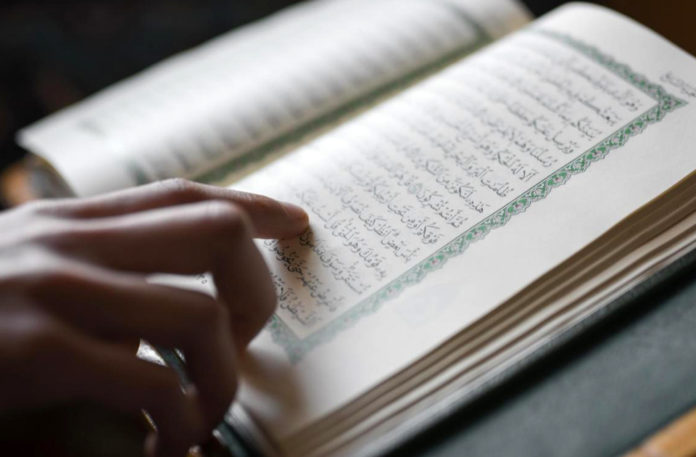It is recommended for the one who is reciting the Qur`aan to say Aameen after having recited al-Faatihah and after a short pause upon completing the word ‘daalleen’ so as to differentiate between that which is the Qur`aan and that which is not.
The meaning of Aameen in the eyes of the majority is, ‘O Allah respond to our supplication.’ Maqaatil said that it gives strength to the supplication and is a cause for the descent of blessings.
In Surah Yunus the following supplication of Musaa (AS) is mentioned,
| “Musaa said, ‘O Lord! You have indeed bestowed splendour and wealth upon Pharaoh and his chiefs in the life of this world, our Lord! That they may lead men astray from Your path. Our Lord! Destroy their wealth and harden their hearts so that they will not believe until they see the painful torment.’ Allah said, ‘verily the supplication of you both is answered…’.” [Yunus (10): 88-89] |
In the commentary to this verse it is stated that Musaa was saying the supplication and Haaroon was saying Aameen and hence he was considered to be amongst the supplicants. [1]
Al-Hakeem at-Tirmidhee reports in ‘Nawaadir al-Usul’ from Anas bin Maalik (RA) that the Messenger of Allah ﷺ said,
| Allah has given my nation three things that were not given to any nation before them: The salaam, which is the greeting of the inhabitants of Paradise; the rows of the Angels; and the Aameen, which was only previously given to Musaa and Haaroon. [2] |
Ibn Maajah also reports from Aa`ishah (RA) that the Messenger of Allah ﷺ said,
| The Jews do not envy you for anything as much as they envy you for saying the Salaam and Aameen. [3] |
Abu Daawood reports from Abu Misbah al-Maqraanee that he said, We were sitting with Abu Zuhayr an-Numairee who was one of the Companions and his speech used to be the most beautiful speech. Whenever a person from amongst us supplicated he would say, “complete it by saying Aameen for indeed Aameen is like the seal on a scroll.”
Abu Zuhayr said, “shall I not inform you about this? We left with the Messenger of Allah ﷺ one night and we came upon a person who was persistently and actively [supplicating] for something so the Prophet ﷺ stood listening to him. Then the Prophet ﷺ said, ‘it will definitely be answered if he completes it.’ A man from amongst the people [present] asked, ‘with what should he complete it?’ He replied, ‘by saying Aameen for if he completes it by saying Aameen it will definitely be answered.’ So the man who asked turned away and went to the supplicant and said, ‘O so-and-so! Complete [your supplication] and rejoice.'” [4]
With regards to prayer then Muslim reports from Abu Musaa al-Ash`aree (RA) that he said, The Messenger of Allah ﷺ addressed us and explained to us our sunnah [that we should follow] and explained to us [the method of performing] our prayer. He said, “when you pray then straighten your rows, then let one of you lead you. When he says the takbeer then say the takbeer, when he says, ‘not the path of those who have earned [Your] Anger nor those who have gone astray’ then say Aameen and Allah will respond to you.” [5]
Abu Hurayrah (RA) reports from the Messenger of Allah ﷺ that he said, When the Imaam says Aameen then say Aameen for indeed the one whose Aameen coincides with the Aameen of the Angels will have his previous [minor] sins forgiven. [6]
So this hadeeth shows that ones previous sins will be forgiven if four conditions are met:
- The Imaam saying Aameen.
- The Follower saying Aameen.
- The Angels saying Aameen.
- The statements coinciding.
Abu Daawood reports from Waa`il bin Hujr (RA) that when the Messenger of Allah ﷺ finished reciting al-Faatihah he would say, “Aameen” loudly, prolonging his voice. [7]
Footnotes
{1} As stated by Abu al-Aaliyah, Abu Saalih, Ikrimah, Muhammad bin Ka`b and ar-Rabee` bin Anas. Refer to ‘Tafseer ibn Katheer’ [2/565]
{2}
{3} Sunan ibn Maajah [no. 856] and it is saheeh as in ‘Saheeh ibn Maajah’ [no. 697]
{4} Sunan Abu Daawood [Eng. Trans. 1/239 no. 938]. It is da`eef as in ‘Da`eef Abu Daawood’ [no. 199]
{5} Saheeh Muslim [Eng. Trans. 1/221 no. 800]
{6} Saheeh Muslim [Eng. Trans. 1/225 no. 809]
{7} Abu Daawood [Eng. Trans. 1/238 no. 932], Bukhari in ‘Juz al-Qiraa`ah’ with a saheeh isnaad as stated by al-Albaanee in ‘The Prophet’s Prayer Described’ [pg. 24].
Ahmad and at-Tirmidhee report it with the words, ‘prolonging his voice.’
The hadeeth has also been reported by Alee, ibn Mas`ud and others.
(NOTE: If you want to build a strong and powerful relationship with Allah, check out Islamia TV, where you can watch Islamic speakers from across the globe deliver inspiring and motivational courses. Learn more at www.islamia.tv.)






















